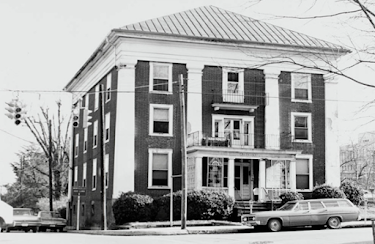Saving Monticello: The
Newsletter
The latest
about the book, author events, and more
Newsletter
Editor - Marc Leepson
Volume
XXI, Number 3 March
2024
COLLEGE TOPICS: I was doing my usual snooping
around online a few weeks ago, looking for hitherto undigitized primary-source
material about Monticello during the Levy Family’s ownership (1834-1923), when
I saw something promising. The Library of Virginia’s Virginia Chronicle, an online
archive of nearly a half million issues of historical Virginia newspapers, had
just digitized the University of Virginia’s original student newspaper, College
Topics, from its inception in 1890 to 1916.
I immediately went to https://bit.ly/VaChronicle (the site) and began searching for mentions of Jefferson Levy, who owned Monticello during those years—and found several articles on subjects that I’d seen before during my research in other publications—and a few that I hadn’t.
That latter included a short, two-paragraph item in the January 27, 1909, College Topics (below), that further buttressed what I wrote 23 years ago in Saving Monticello: that Jefferson Levy was, in the newspaper’s words, “a staunch friend of the University.”
I learned of Levy’s largess to the University when I researched Saving Monticello. Among other things, as I noted in the book, was that in April 1899, in commemoration of Jefferson's birthday, Levy gave the University a large regulator clock for its library, along with two 56-inch steel clock dials for the Rotunda (to replace the originals that had been destroyed in the famed 1895 fire), and a device that electronically controlled the bells in all the University's lecture rooms.
The 1909 article reports that JML would be donating a “splendid” copy of a “famous painting,” St. Paul Before Agrippa (most likely by the 18the century artist Sir James Thornhill) to the University’s Madison Hall, which had been built in 1901 and served as the local YMCA headquarters.
In the early 20th century Madison Hall (in the vintage postcard, below), on University Avenue across from the Rotunda, had also become the unofficial U-Va. student union. That august building today houses the office of the University’s President.
More perusing of the newspaper now known as The Cavalier Daily turned up a slew of ads for the Levy Opera House, the big, three-story Georgia-style brick building on the corner of Park and High Streets in downtown Charlottesville dating from 1852, which Jefferson Levy bought in 1887. A gathering spot for local groups, traveling speakers, and touring theatrical companies known as Town Hall, by the mid-1880s the building had fallen into disrepair and disuse. The entrepreneurial Levy remodeled it and in 1888 renamed it the Levy Opera House.
In 1891 Jefferson
Levy leased the Opera House to Jacob (“Jake”) Leterman and Ernest Oberdorfer,
sons of the founders of Charlottesville’s German Reform synagogue, Congregation
Beth Israel. Leterman and Oberdorfer brought in symphony orchestras, minstrel
shows, and many other types of theatrical productions.
Here are two ads from the November 11, 1893, College Topics filled with details about two typical, late-nineteenth century productions: a road company version of the long-running Broadway musical “The Black Crook,” a retelling of the Faust story; and a touring company’s comedic farce, “Niobe,” involving a marble statue of the Greek mythological figure brought to life after being hit by lightning, which would go to London and have a 500-plus performance run the following year on the city’s West End.
The Levy Opera House, which closed in 1912, later was converted into apartments. Then, in the early 1980s, it was used as office space. Today, as I recently learned from my friend and C’ville native Amoret Bruguiere, more changes are afoot at the Levy Opera House, which most recently had been used as overflow space for the nearby Albemarle County courts complex.
As we speak, the three-story
building, (in the 1960s photo, below), is being renovated and remodeled
one more time. When completed in 2027, the Opera House will house the County
Commonwealth Attorney’s offices as part of a new, $37-million joint
Charlottesville-Albemarle County courts complex. The complex will include both
the City of Charlottesville’s and the County’s General District Courts and
their offices.
The Opera House will be preserved, and will be getting a new roof to replace the current metal one. All of the exterior brickwork will be restored, and much of the rear wall will be demolished and connected to a new multi-story annex building that will be part of the courts part of the complex (see mockup below).
EVENTS: Subscribers may have noticed that this newsletter has arrived a few weeks later in the month than all the others. That’s because I spent the first half of March finishing my next book, a slice-of-life biography of U.S. Navy Seaman Apprentice Doug Hegdahl, the lowest-ranking and youngest American captured in North Vietnam and held prisoner there during the Vietnam War.
The new pub date for the book—tentatively titled, The Unlikely War Hero—is December 17. You can get a sneak preview of what the book is about at https://bit.ly/PrePubInfo
As for events, I have talks scheduled for
April and later in the year. For details, check the Events page on my website: marcleepson.com/events
THE ELEVENTH PRINTING: My friends at the University of Virginia Press tell me that the
paperback Saving Monticello, which the Press began publishing in 2003
after the Simon & Schuster hardcover went out of print, will be going into
its eleventh printing. The paperback now is on backorder until physical
copies come off the presses.
In
the meantime, if you would like a new paperback of Saving Monticello, I have a few on hand.
To order
that book, or the just-published hardcover of Huntland, go to this page
on my website https://bit.ly/BookOrdering or email me at marcleepson@gmail.com I also have a few used Saving Monticello hardcovers and a stack of five of my other books: Flag:
An American Biography; Desperate Engagement; What So Proudly We Hailed; Flag: An American Biography; and Ballad of the Green Beret.







